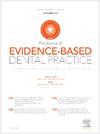Ethical Aspects of Implementing Dental Patient-Reported Outcomes On Different Patient Populations: A Narrative Review
IF 4
4区 医学
Q1 DENTISTRY, ORAL SURGERY & MEDICINE
引用次数: 0
Abstract
Introduction
Dental Patient-Reported Outcomes (dPROs) are patient-provided information regarding treatment outcomes and oral health-related quality of life. However, considering the sensitive health information collected during the implementation of dPROs, it is important to study the relevant ethical aspects. Hence, this review synthesized the current evidence to explain and critically evaluate the key ethical issues associated with dPROs use in various patient populations.
Methods
A narrative review approach was employed to analyse ethical challenges reported in the literature concerning the use and implementation of dPROs across various population groups. Relevant literature from 2005 to 2024 was sourced using databases like Google Scholar, Scopus, and Web of Science.
Results
Four key ethical issues were identified: 1) acquiring Informed Consent, 2) maintaining Privacy and Confidentiality, 3) addressing the disparities in Equity of Access to oral care, and 4) upholding Cultural Sensitivity in diverse communities.
Discussion
This study offered insights into the application of the identified four key ethical issues within diverse populations. Additionally, the study provides constructive recommendations for the ethical implementation of dPROs in various patient populations. Ethical challenges related to less-researched populations, various other ethical aspects, and emerging ethical issues were also explored.
Conclusion
Future research should focus on refining informed consent processes for vulnerable populations and strengthening data privacy. Additionally, the development of culturally adapted dPRO tools could enhance communication and improve patient satisfaction and patient experience. Addressing these concerns is crucial for ensuring the ethical deployment of dPROs while safeguarding patient rights and welfare.
在不同患者群体中实施牙科患者报告结果的伦理方面:叙述回顾
牙科患者报告的结果(dPROs)是患者提供的关于治疗结果和口腔健康相关生活质量的信息。然而,考虑到在实施dPROs期间收集的敏感健康信息,研究相关的伦理方面是很重要的。因此,本综述综合了目前的证据,以解释和批判性地评估与在不同患者群体中使用dPROs相关的关键伦理问题。方法采用叙述性回顾法分析文献中关于在不同人群中使用和实施dPROs的伦理挑战。2005年至2024年的相关文献来源于谷歌Scholar、Scopus和Web of Science等数据库。结果确定了四个关键的伦理问题:1)获得知情同意;2)维护隐私和保密;3)解决口腔护理公平获取的差异;4)维护不同社区的文化敏感性。本研究为确定的四个关键伦理问题在不同人群中的应用提供了见解。此外,该研究为dPROs在不同患者群体中的伦理实施提供了建设性的建议。与研究较少的人群相关的伦理挑战,各种其他伦理方面,以及新兴的伦理问题也进行了探讨。结论未来的研究应侧重于完善弱势群体的知情同意流程和加强数据隐私。此外,开发适应文化的dPRO工具可以加强沟通,提高患者满意度和患者体验。解决这些问题对于确保在维护患者权利和福利的同时合乎道德地部署dPROs至关重要。
本文章由计算机程序翻译,如有差异,请以英文原文为准。
求助全文
约1分钟内获得全文
求助全文
来源期刊

Journal of Evidence-Based Dental Practice
DENTISTRY, ORAL SURGERY & MEDICINE-
CiteScore
6.00
自引率
16.70%
发文量
105
审稿时长
28 days
期刊介绍:
The Journal of Evidence-Based Dental Practice presents timely original articles, as well as reviews of articles on the results and outcomes of clinical procedures and treatment. The Journal advocates the use or rejection of a procedure based on solid, clinical evidence found in literature. The Journal''s dynamic operating principles are explicitness in process and objectives, publication of the highest-quality reviews and original articles, and an emphasis on objectivity.
 求助内容:
求助内容: 应助结果提醒方式:
应助结果提醒方式:


